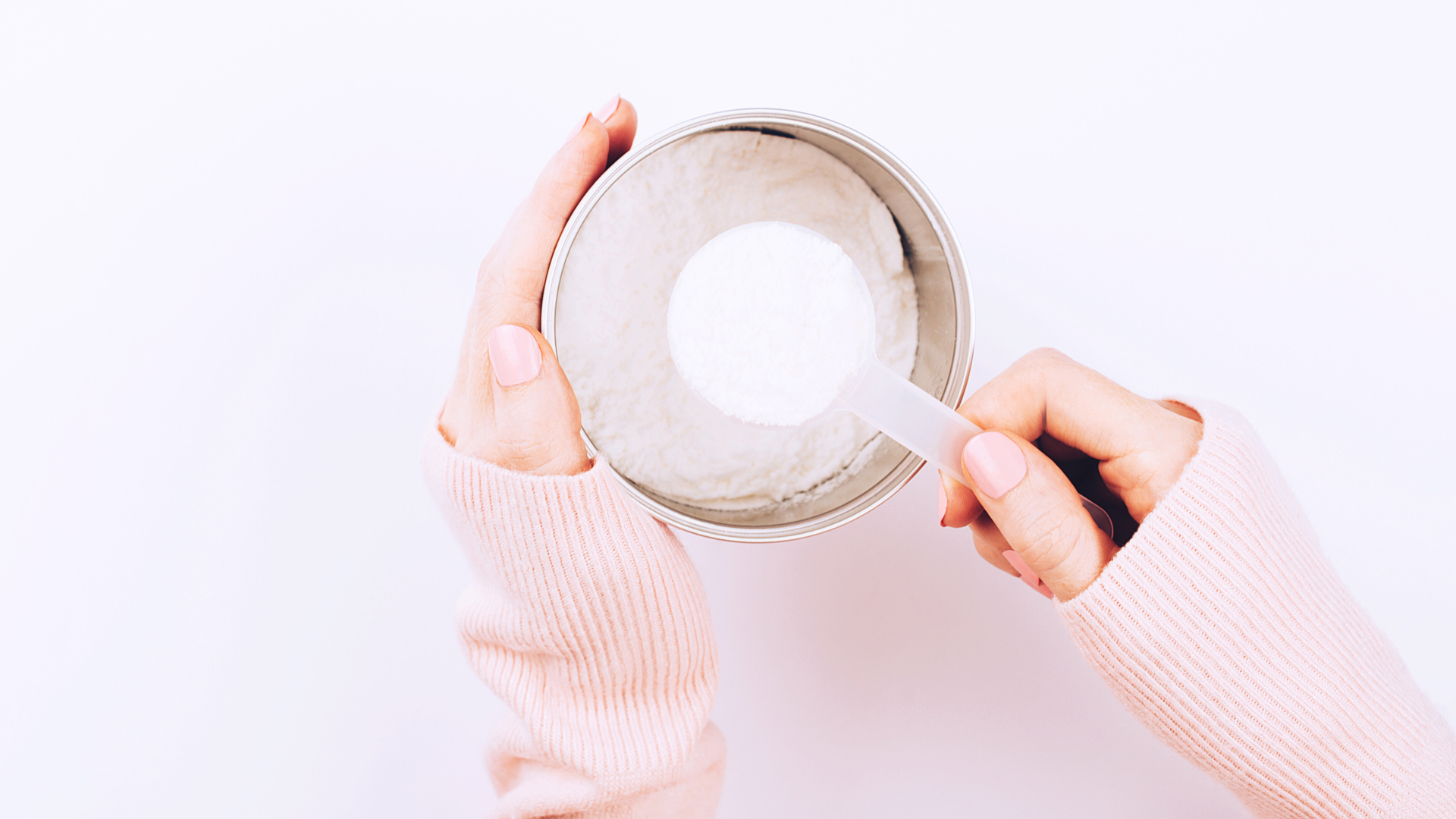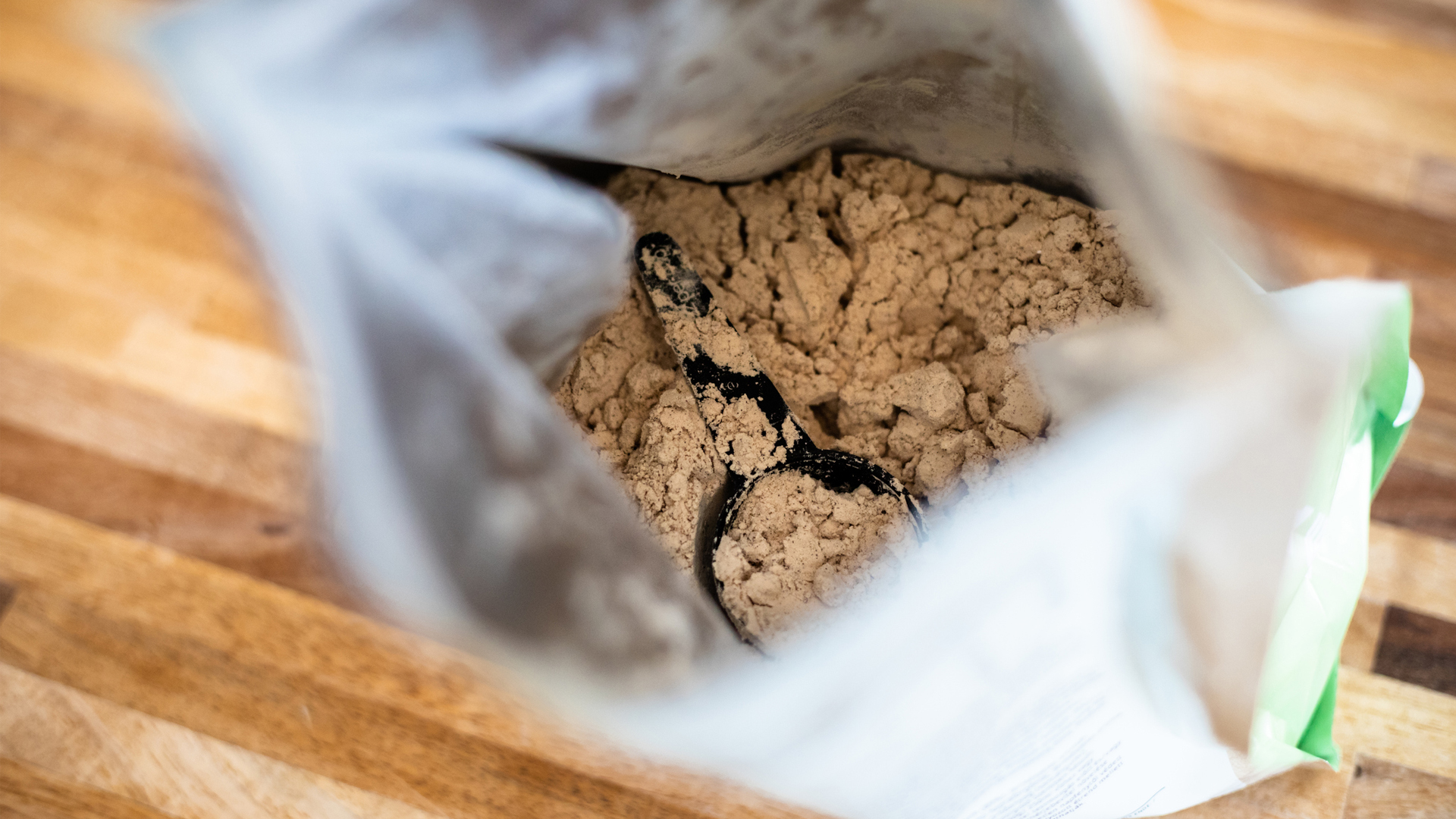Collagen vs whey protein: what’s the difference?
Protein supplements are incredibly popular, but which type is best for your health? A dietician weighs up the pros and cons of collagen vs whey protein

Start your week with achievable workout ideas, health tips and wellbeing advice in your inbox.
You are now subscribed
Your newsletter sign-up was successful
Collagen vs whey protein — which is best? Protein supplements are something many people have incorporated into their daily diet. Most use it to increase their muscle mass, but research has also found that the best protein powder for weight loss can help you to shed unwanted pounds. The benefits may even be more fine tuned than that, as a 2010 study in the International Dairy Journal suggested that protein powder could significantly reduce blood pressure in patients with hypertension.
“In addition to preserving and building muscle tissue, protein provides building blocks, called amino acids, for nearly all tissues in the body including organs, bone and skin,” says Kat Barefield, a registered dietician and NASM Nutrition Master. “These building blocks are needed in all aspects of metabolism including hormone production and immune function.”
With so many protein powders on the market, it can be difficult to know where to start when it comes to finding the one that’s right for you. Two of the most common forms of protein supplement are whey and collagen, which each have specific, various benefits. We asked Barefield to weigh up the pros and cons of each type.
What is collagen?
You might have heard about collagen in relation to the skin, as many people supplement it or apply it topically to boost skin strength and elasticity. However it’s also important for other natural processes our body completes, including healing wounds and bone health.
“Collagen is a structural protein contained in skin, bone, cartilage and connective tissue,” says Barefield.

Kat Barefield has more than 15 years of experience in the health and fitness industry. She received her Bachelor's degree from San Diego State University, and a Master's degree in Dietetics and Sports Nutrition from California State Polytechnic University-Pomona.
According to research, collagen is one of the most prevalent proteins in our body, with a 2010 study in the Annual Review of Biochemistry suggesting that one-third of the protein produced in our bodies is collagen-based. Although our bodies naturally produce collagen, it declines as we age, which is why it can be helpful in some cases to supplement with it.
What is whey protein?
Whey is probably the most common source of protein used in powders and supplements.
Start your week with achievable workout ideas, health tips and wellbeing advice in your inbox.
“Derived from cow’s milk, whey protein is the highest-quality protein source due its abundance of all essential amino acids and high digestibility,” says Barefield.
You can obtain whey protein from some dairy products. However, it’s difficult to get enough from your diet alone: the protein in cow’s milk, for example, is only 20% whey, so it’s best to supplement with it for maximum effect.

Collagen vs whey protein: What's the difference?
Joint and skin health
As well as boosting your protein levels, taking collagen as a protein supplement has other benefits, according to Barefield:
“Type II collagen supplements improve joint health support, alleviating joint pain and stiffness. Type II collagen has also been shown to improve fine lines, wrinkles and skin hydration,” she says.
Whey protein, on the other hand, is mainly geared towards muscle repair and growth.
Muscle growth
As well as containing a high dose of all the essential amino acids and being easily digestible, Barefield says that, “whey protein is also high in leucine, the amino acid that turns on the muscle repair and building process.”
While collagen offers benefits for the body, one of which is muscle growth, whey protein might have more to offer when it comes to increasing muscle mass. In a 2018 study published in the International Journal of Sport Nutrition and Exercise Metabolism, which compared the effects of whey and collagen on skeletal muscle, researchers found that whey stimulated higher rates of protein synthesis.
However, another study suggested that collagen may be better than whey for maintaining a positive nitrogen balance in the body. This might sound complicated, but having a positive nitrogen balance basically means that our bodies are well-nourished and well-exercised (a negative nitrogen balance is associated with malnourishment and/or overtraining). A positive nitrogen balance can help to promote muscle growth, which means collagen protein is beneficial in this respect.

Recovery and pain relief
Collagen also might be better than whey at promoting injury recovery and pain relief because it contains high amounts of the amino acid glycine, which has anti-inflammatory effects. It could speed up the healing process for exercise-induced joint pain and conditions like tendonitis.
Weight loss
Many studies on collagen focus on its effect on elderly people – because this age group tend to be the people who are naturally lacking in the protein – and they have suggested that collagen could help to decrease fat-mass as well as increase muscle mass. However, studies looking at whey protein have made similar conclusions, so it seems like they both have similar effects when it comes to weight loss.
However it is useful to note that collagen protein might be more satiating than whey protein. A study published in Clinical Nutrition found that collagen was 40% more filling than whey or other types of protein. However, the research on this is limited and another study, in the journal Nutrients, found that the two types of supplement were equally satiating.
Absorbability
One area where the supplements might differ is absorbability, which refers to how quickly the body reacts to the amino acids from the protein. Collagen supplements contain hydrolyzed collagen, which research, including in Nutrients, has found has a good absorption rate, meaning its main amino acids could be absorbed into the body only 20 minutes after ingestion. Compared with whey protein, which studies have suggested could take up to 90 minutes for the body to absorb without digestive enzymes, collagen protein might be more effective when it comes to absorption.
Amino acids
It’s key to note that whey protein contains all nine essential amino acids, while collagen contains eight.
“The main con of collagen protein supplements is that it’s an incomplete protein source, so you won’t be getting all of the essential amino acids your body needs. Therefore, you’ll need to consume other sources of protein,” says Barefield.
Collagen vs whey protein: which is best?
Collagen and whey protein have a range of individual benefits. Deciding which protein will be better for you will also be based on your needs and goals. Collagen protein might be better for elderly people, whereas whey protein seems to be best for people who are training regularly and are looking to hit protein targets. However, all the other aspects mentioned above are important to consider. Collagen, of course, is a good option for people who follow a dairy-free diet, as whey contains dairy.
“Between whey protein and collagen protein, I would recommend whey protein because it’s a convenient, high-quality, complete protein source that’s easily absorbed whereas collagen is an incomplete protein source,” says Barefield.
This doesn’t mean that collagen is ineffective, but whey protein might be a good place to start, unless your needs or goals are compatible with collagen protein’s benefits.
Alice Porter is a freelance journalist covering lifestyle topics including health, fitness and wellness. She is particularly interested in women's health, strength training and fitness trends and writes for publications including Stylist Magazine, Refinery29, The Independent and Glamour Magazine. Like many other people, Alice's personal interest in combining HIIT training with strength work quickly turned into a CrossFit obsession and she trains at a box in south London. When she's not throwing weights around or attempting handstand push-ups, you can probably find her on long walks in nature, buried in a book or hopping on a flight to just about anywhere it will take her.